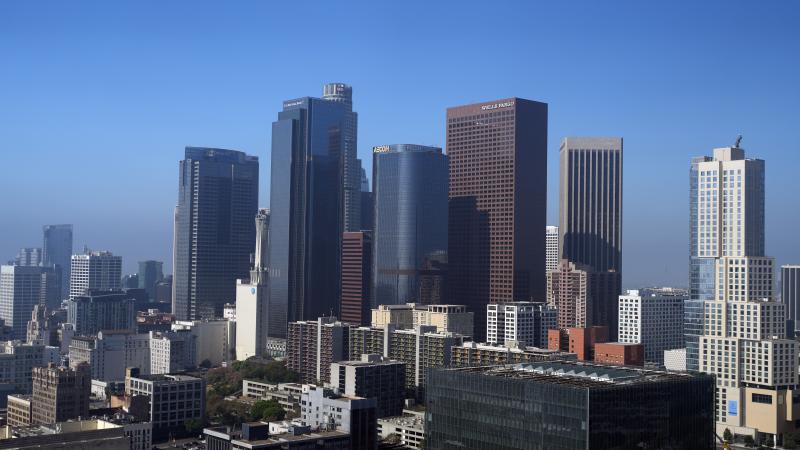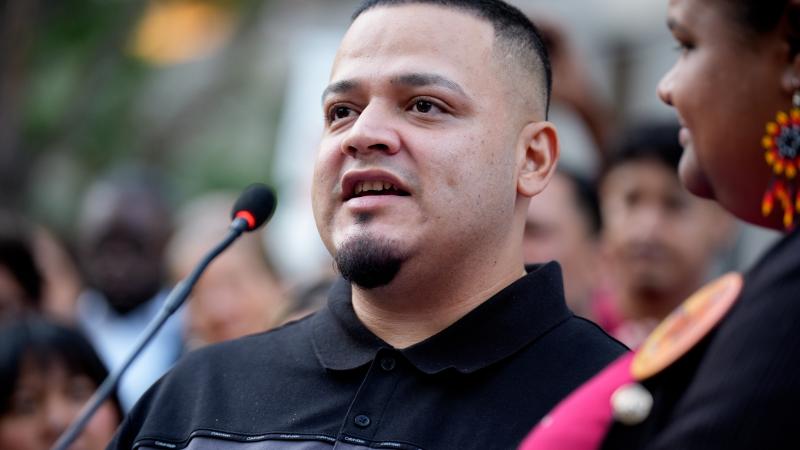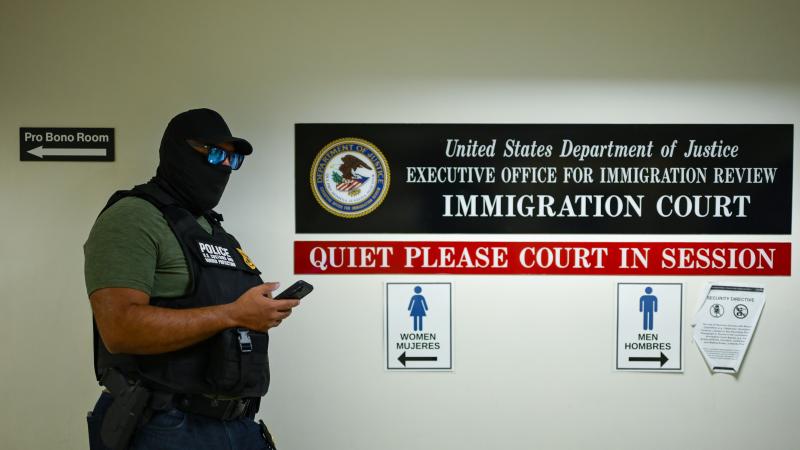Trump criticizes Durham, but says Horowitz wrote ‘vicious and true’ report exposing Comey & FBI
Trump weighs in on prior Russiagate investigations by Michael Horowitz and John Durham following reporting by Just the News that Kash Patel's FBI is reinvestigating the collusion saga as part of a "grand conspiracy" inquiry.
President Donald Trump criticized the investigation of the investigators run by former Justice Department special counsel John Durham, in a exclusive interview Wednesday with Just the News, as the president praised the work done by then-DOJ inspector general Michael Horowitz in unearthing the FBI’s wrongdoing during the Russiagate saga.
Trump made the comments in the midst of an interview on Just the News, No Noise about efforts by FBI Director Kash Patel to examine potential criminality carried out by since-fired FBI Director James Comey and the bureau during its flawed and politicized Crossfire Hurricane investigation.
“And I will say this, the Durham report was preceded by the Horowitz report, and [then-Attorney General] Bill Barr should’ve used the Horowitz report," Trump said. "You didn’t need the Durham report, because say what you want about Mr. Horowitz, he was appointed by Democrats, but he wrote the most vicious – and true! – report that you’ve ever seen on somebody, and that was on James Comey, and I believe a couple other people in the FBI that were crooked. But this report was so big. ... And for some reason, Bill Barr didn’t use it. I never — it’s such a disappointment, but he didn’t use it.”
Horowitz – appointed to his role as DOJ inspector general by then-President Barack Obama in 2012 – left the DOJ watchdog role only in recent weeks and began work as head of the Federal Reserve Board's Office of Inspector General at the end of June.
Durham, a former U.S. attorney for Connecticut, was appointed special counsel by Barr in October 2020 and left the role after finishing his investigation in 2023.
“Instead, Barr wanted to do a further report, so he put Durham in charge and, you know, Durham took years, it took so many years, I think it was just a tapping. They tapped it along forever," Trump continued. "By the time he came out with the report, everybody was old and looking to retire. … I’d love for you to look at the Horowitz report – it was absolutely incredible, and had more credibility because he’s a Democrat.”
Just the News had reported Monday that the FBI quietly launched a “grand conspiracy” investigation into a decade of Democratic Party and "deep-state" lawfare, ranging from ginning up the Trump-Russia collusion to examining special counsel Jack Smith's pursuit of Trump.
That news could open the door for the appointment of a special prosecutor to examine whether the years of politicization would support a presentation to a grand jury regarding a criminal conspiracy to influence three consecutive presidential elections to the benefit of Democrats and to the detriment of Trump.
“I’m happy that they did that,” Trump further told Just the News, No Noise on Wednesday when asked about it. “I don’t know much about it, but it deserves to be done. It was a disgrace what happened. … I love that they’re looking at this stuff, if they are. I hope they are.”
Trump promises declassification in Horowitz & Durham reports
Trump also said Wednesday that he would be in favor of declassifying two key pieces of evidence highlighted by Just the News.
The first slice of evidence is a classified annex to a 2018 report by Horowitz tied to his probe of Hillary Clinton’s improper email server. The annex has long been sought by Senate Judiciary Committee Chairman Chuck Grassley, R-Iowa, and the annex may show that credible information about possible wrongdoing was intentionally ignored by the FBI.
Grassley explained the significance of the evidence in a letter he sent in 2019 to Barr, saying that Horowitz’s “classified appendix raises significant issues associated with the FBI’s failure to review certain highly classified information in support of its Midyear investigation.”
Trump told Just the News that “I would do that” when asked if he would declassify this annex to the Horowitz report. “Absolutely. I think it should be looked at. The whole thing was a scam. I would do that broadly.”
The second piece of evidence was highlighted by Durham as he laid out Crossfire Hurricane wrongdoing in his final report in 2023. The evidence was dubbed in the report as the “Clinton plan intelligence" – and it was also placed in a classified annex that has been kept from the American public and even many members of Congress.
Durham said Obama CIA Director John Brennan's handwritten notes – declassified by John Ratcliffe when he was the director of national intelligence in October 2020 – reflect that Brennan briefed Comey, then-President Barack Obama, then-Vice President Joe Biden, and others in the summer of 2016 regarding the "alleged approval by Hillary Clinton on 26 July of a proposal from one of her [campaign] advisors to vilify Donald Trump by stirring up a scandal claiming interference by the Russian security services."
Durham’s report said that its classified annex “provides further information about (i) the details of the Clinton Plan intelligence; (ii) facts that heightened the potential relevance of this intelligence to the Office's inquiry; and (iii) the Office's efforts to verify or refute the key claims found in this intelligence.”
“I would declassify it, yeah. Why not?” Trump told Just the News when asked about this classified annex. “I would absolutely declassify it.”
All of this comes after Ratcliffe as CIA director sent a criminal referral to Patel related to possible criminality by Brennan, sources familiar with Ratcliffe's actions who declined to be named told Just the News last week, following a review by the CIA released earlier this month.
Horowitz and the FBI’s Clinton emails investigation
Horowitz’s report criticizing the FBI’s Midyear Exam investigation into Clinton’s illicit use of a private email server to send classified information while she was secretary of state was released in June 2018, concluding Comey’s actions were “extraordinary and insubordinate” when he announced Clinton wouldn’t be charged in a speech on July 5, 2016. Comey had said in the speech that Clinton’s email practices were “extremely careless” but that he also allegedly believed “no reasonable prosecutor” would bring charges against her. Comey gave the speech after then-Attorney General Loretta Lynch’s tarmac meeting with former President Bill Clinton in June 2016.
“We concluded that Comey’s unilateral announcement was inconsistent with Department policy and violated long-standing Department practice and protocol by, among other things, criticizing Clinton’s uncharged conduct,” the DOJ inspector general concluded at the time. ”We also found that Comey usurped the authority of the Attorney General, and inadequately and incompletely described the legal position of Department prosecutors.”
The 2018 report by the DOJ watchdog also uncovered evidence that the FBI had delayed following up on information about Clinton emails found on a laptop belonging to disgraced former Rep. Anthony Weiner, D-N.Y., and that the delay may have come from the FBI’s desire to emphasize the baseless Trump-Russia collusion investigation over the Clinton emails scandal.
In 2016, since-fired FBI special agent Peter Strzok had exchanged a host of anti-Trump texts with former FBI lawyer Lisa Page, with whom he was having an affair. Horowitz wrote, “We did not have confidence that Strzok’s decision to prioritize the Russia investigation over following up on the Midyear-related investigative lead discovered on the Weiner laptop was free from bias.”
Horowitz criticizes McCabe
The DOJ watchdog also released a report in 2018 detailing multiple instances in which since-fired FBI deputy director Andy McCabe “lacked candor” with Comey, FBI investigators, and inspector general investigators about his authorization to leak sensitive information to the Wall Street Journal that revealed the existence of an FBI investigation into the Clinton Foundation.
Comey said he did not permit McCabe to tell the media, and Horowitz wrote that McCabe’s actions were “designed to advance his personal interests at the expense of Department leadership” and “violated the FBI’s and the Department’s media policy and constituted misconduct.”
McCabe denied wrongdoing, and his lawyers declared that “justice has been done” when charges weren’t filed.
Horowitz goes after Comey and his “Comey Memos”
Horowitz then wrote another report, released in August 2019, criticizing Comey’s decision to leak his so-called “Comey Memos” – including details about Trump’s alleged comments about Lt. Gen. Mike Flynn – to the media in 2017 in an effort by the then-fired FBI director to spur the appointment of a special counsel.
“We have previously faulted Comey for acting unilaterally and inconsistent with Department policy,” the DOJ watchdog wrote. “Comey’s unauthorized disclosure of sensitive law enforcement information about the Flynn investigation merits similar criticism.”
Comey admitted in 2017 that he had hoped leaking this information “might prompt the appointment of a special counsel.” Horowitz concluded Comey’s leaks were “an attempt to force the Department to take official investigative actions.”
“Comey had several other lawful options available to him to advocate for the appointment of a special counsel, which he told us was his goal in making the disclosure,” Horowitz wrote. “What was not permitted was the unauthorized disclosure of sensitive investigative information, obtained during the course of FBI employment, in order to achieve a personally desired outcome.”
Horowitz sent a criminal referral to the DOJ over Comey’s memos at the time, but the DOJ declined to prosecute.
Comey’s leak efforts were successful, and Robert Mueller was appointed special counsel within days of the Comey Memo leaks making their way to the New York Times. After two years, Mueller “did not establish” any criminal Trump-Russia collusion.
Horowitz tears apart Crossfire Hurricane and the FBI’s FISA scandal
Horowitz then uncovered huge flaws with the FBI’s Crossfire Hurricane investigation in a December 2019 report, finding at least 17 “significant errors and omissions” related to the FISA warrants targeting former Trump campaign associate Carter Page. Horowitz also criticized the “central and essential” role of British ex-spy Christopher Steele’s debunked dossier in the FBI’s politicized FISA surveillance. Steele had been hired by the opposition research firm Fusion GPS, which was being paid by Clinton campaign lawyer Marc Elias.
The DOJ watchdog also said Steele’s alleged main source – Igor Danchenko – “contradicted the allegations of a ‘well-developed conspiracy’ in” Steele’s dossier.
Horowitz’s report noted that Steele’s FBI interview “highlighted discrepancies between Steele’s presentation of information in the election reporting and the views of his Primary Sub-source” – Danchenko – and “revealed bias against Trump.”
FBI notes of a January 2017 interview with Danchenko showed he told the bureau he “did not know the origins” of some Steele claims and “did not recall” other dossier information.
Steele’s source told the FBI that Steele mischaracterized at least one of his Russian source contacts. Horowitz revealed Danchenko also noted much of what he gave to Steele was “word of mouth and hearsay,” some of which stemmed from a “conversation that [he] had with friends over beers,” and the most salacious allegations may have been made in “jest.”
Horowitz testified in December 2019 that “there are significant serious failures here on the operation – particularly in connection with FISAs” and that “whether it was sheer gross incompetence that led to this versus intentional misconduct or anything in between and what the motivations are, I can’t tell you as I sit here today.”
“As to the failures that occurred, we didn’t find any of the explanations particularly satisfactory – in fact, unsatisfactory across the board,” Horowitz testified a little later that month.
“In the absence of satisfactory answers, I can’t tell you as I sit here whether it was gross incompetence. And I think with the volume of errors, I think you could make an argument that that would be a hard sell as to gross incompetence, to intentional, or somewhere in between, and what the motivations were.”
Horowitz also revealed that a defensive briefing given to then-candidate Donald Trump in August 2016 was actually a pretextual briefing which the FBI exploited to advance its Crossfire Hurricane investigation into the Trump campaign.
“They sent a supervisory agent to the briefing from the Crossfire Hurricane team, and that agent prepared a report to the file of the briefing about what Mr. Trump and Mr. Flynn said,” Horowitz testified in 2019. “So the agent was actually doing the briefing but also using it for the purpose of investigation.”
The Horowitz report’s declassified footnotes also said that the Crossfire Hurricane team had received information “indicating the potential for Russian disinformation influencing Steele's election reporting.”
The footnote said that some of the Steele dossier’s claims about now-former Trump lawyer Michael Cohen were “part of a Russian disinformation campaign to denigrate U.S. foreign relations.” And the footnote added that a U.S. intelligence community report concluded that the Steele dossier’s baseless and salacious claims about Trump at the Ritz Carlton Moscow were the result of Russian intelligence who "infiltrate[d] a source into the network" managed by Steele.
Horowitz and Durham go after Clinesmith
It was also Horowitz who served up ex-FBI lawyer Kevin Clinesmith to be hit with the sole successful criminal prosecution carried out by Durham.
Horowitz’s June 2018 report unearthed Clinesmith’s clear biases against Trump, and his December 2019 report detailed Clinesmith’s criminal behavior related to the FISA process. The FBI lawyer had worked on both the Hillary Clinton emails investigation and the Trump-Russia inquiry.
The DOJ watchdog detailed a lengthy instant message exchange between Clinesmith and another FBI employee on Nov. 9, 2016 – the day after Trump’s presidential victory – where Clinesmith lamented Trump’s win and worried about the role he had played in the investigation into Trump and his campaign.
“My god damned name is all over the legal documents investigating his staff,” Clinesmith said. “So, who knows if that breaks to him what he is going to do?”
Clinesmith also declared “Viva le resistance” later in November 2016.
He would plead guilty to falsifying a document during the bureau’s efforts to renew FISA authority to wiretap Carter Page. Clinesmith admitted in August 2020 that he had falsely edited a CIA email in 2017 to state that Page was “not a source” for the CIA when the agency had actually told the bureau on multiple occasions that Page had been an “operational contact” for the CIA.
Judge James Boasberg would deny Durham’s efforts to seek up to six months behind bars for Clinesmith, instead giving him a year of probation, 400 hours of community service and no fine.
Durham unearths wrongdoing — but picks up no extra convictions
Durham’s special counsel inquiry further undercut the dossier’s credibility and resulted in indictments against Steele dossier source Danchenko, as well as against Elias’s former Perkins Coie law partner, Michael Sussmann, with whom Elias worked closely in 2016.
Danchenko and Sussmann were found not guilty at trial.
According to Durham, Danchenko had anonymously sourced a fabricated claim about Trump campaign manager Paul Manafort to Hillary Clinton ally Chuck Dolan, who spent years, including 2016, doing work for Russian businesses and the Russian government. Danchenko denied this, and the judge tossed that charge out before the jury could decide on it.
Durham’s indictment also said Danchenko lied to the FBI about a phone call he claims he received from Sergei Millian, an American citizen born in Belarus, who the Steele source had said told him about a conspiracy of cooperation between former President Donald Trump and the Russians – collusion allegations which the special counsel said were false.
Durham's indictment of Danchenko argued the Steele source falsely told the FBI in 2017 that, in late July 2016, he had received a phone call from Millian. He claimed Millian told him about a well-developed conspiracy of cooperation between Trump and Russians and further allegedly falsely claimed Millian had agreed to meet with him in New York in 2017. Danchenko denied this, and was found not guilty related to these charges.
Durham’s indictment against Sussmann centered on a September 2016 meeting with then-FBI General Counsel James Baker in which Sussmann passed along since-debunked allegations that there was a secret back channel between Russia’s Alfa Bank and the Trump Organization.
Durham alleged that Sussmann told Baker he was not working for any specific client, but Durham said Sussmann was secretly doing the bidding of Clinton’s presidential campaign.
Sussmann, who represented the Democratic National Committee when it was purportedly hacked in 2016, was acquitted after a trial by a jury in the nation’s capital.
Durham’s 2023 report concluded that “neither U.S. law enforcement nor the Intelligence Community appears to have possessed any actual evidence of collusion in their holdings at the commencement of the Crossfire Hurricane investigation.” The special counsel assessed that “the FBI ignored the fact that at no time before, during, or after Crossfire Hurricane were investigators able to corroborate a single substantive allegation in the Steele dossier reporting.”
It will now likely be up to Patel and Attorney General Pam Bondi to determine whether they believe they would have more luck in the trial courtroom than Durham did.
The Facts Inside Our Reporter's Notebook
Links
- potential criminality
- left
- began work
- appointed
- reported
- 2018 report
- letter he sent
- final report in 2023
- reflect
- report
- criminal referral to Patel
- review by the CIA
- report
- tarmac meeting
- the FBIâs desire
- report
- since-fired FBI deputy director
- Andy McCabe âlacked candorâ
- leak sensitive information
- âjustice has been doneâ
- another report
- âdid not establishâ
- Trump-Russia collusion.
- report
- âcentral and essentialâ
- FBIâs politicized FISA surveillance
- report
- interview
- testified
- testified
- testified
- declassified footnotes
- June 2018 report
- December 2019 report
- admitted
- deny
- Hillary Clinton ally Chuck Dolan
- found not guilty
- acquitted
- report
- concluded
- likely be up to
- Attorney General Pam Bondi













